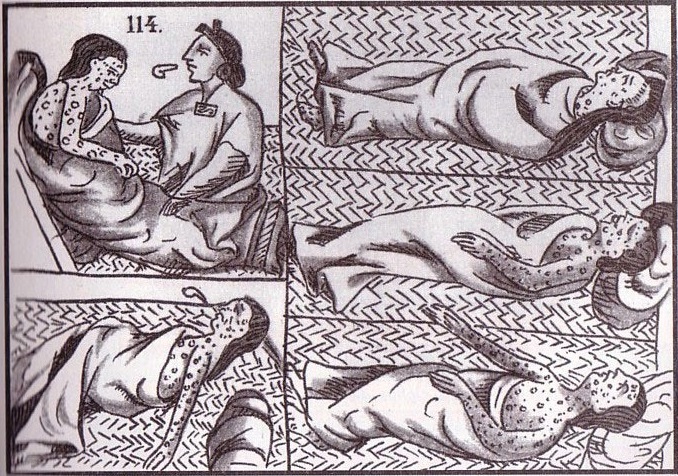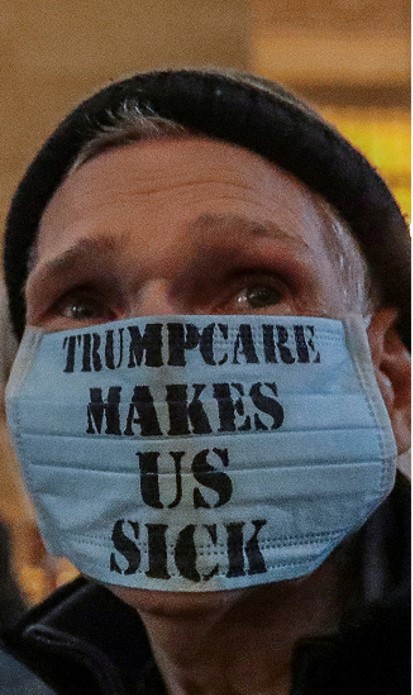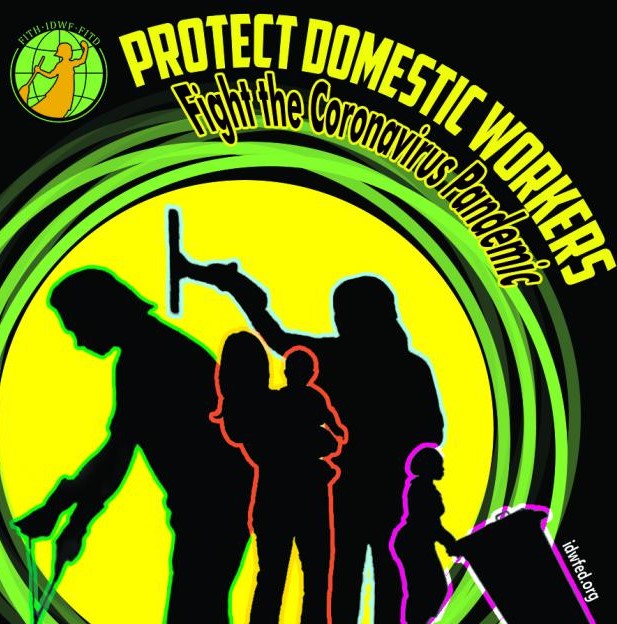By Massimo De Angelis
This crisis will end, but it will not improve anything if at the defeat of a micro-parasite, we let the macro-parasites continue to govern our lives, perhaps around those techniques of social control experimented to combat micro-parasites. Governance that looks at relationships must be based on care and rebuild our sociality and productivity on it.
Recently, an old review by Peter Linebaugh of a 1976 book by William McNeill, Plagues and Peoples circulated on social networks. What interests me here to highlight McNeill’s approach is the general structure of his historical reasoning, starting from prehistoric societies and ending in the late 1700s.
McNeill notes that our survival depends on resistance to two types of parasites, the micro-parasites that inhabit our bodies (bacteria, viruses) and the macro-parasites (the dominant classes) that in different contexts exploit, tax, kill, enslave, humiliate, restructure from the perspective of their economic reasons. Any type of parasite depends on its host, on its vitality, and therefore it is in the parasite’s interest not to weaken its host to death. Instead, a balance must be achieved and the host must be allowed to live to the extent that it produces a surplus for the parasite, whether micro or macro.
There are clearly many differences between these two types of parasites. For example, for the micro-parasite, the body to attack is primarily that of the individual, while for the macro-parasite, the body is primarily the whole social body. But despite this and other obvious differences, this image places our lives and our survival in the middle of two force fields, one at an upper scale and one at a lower scale, forming two contexts of action and reaction, i.e. of relationships, between us and the two types of parasites. In the middle of these two force fields, there are the subjectivities of the multitude, the many subjectivities that move vis-à-vis these two parasites in certain historical phases, with their recomposition and (re)action times, in the spaces and networks that they have been able to produce, following their own life imagery and carving out perspectives of survival.
Thus, if we look at history, a pestilence may have generated a shift of power relations to the advantage of the subordinate classes (as for example in Europe after the Black Plague in the 14th century, from which the peasants’ revolt in England in 1381 resulted in a historical crisis of feudalism). On the contrary, the epidemics brought by the European conquerors to the Americas contributed to the weakening of the resistance of indigenous peoples exterminated by pathogens never experienced on their bodies, such as smallpox, measles and influenza. Between 1492 and 1600, 90 percent of the indigenous peoples in the Americas, or about 55 million people, died as a result of both the violence of the Conquistadores and these novel pathogens.

Image depicting Aztec indians affected by Smallpox, one of the plagues brought by European colonizers and which decimated indigenous populations across the Americas. Source: Wikipedia.
The fight against macro-parasites
The point I would like to make is that the effects of micro-parasites can be used by multitudes against macro-parasites, or on the contrary they can be used by macro-parasites to regulate multitudes. Let us call this the political use of parasites. This use can benefit the multitudes to fight to live in a better world, or the parasites to survive in an environment where they can better adapt and continue to be parasites.
In the current context, the political use of parasites is primarily a matter of emergency, which is linked to the forms of governance of our survival. But in this climate that wants to confine us in the home-work-consumption circuit, it is important to take action to rethink the “normality” of the post-emergency, against the institutionalisation of the emergency after this pandemic, but also against the vacuous hope that the return to rhythms and modes of work and consumption of the middle classes is a socially and ecologically acceptable normality. To start thinking about the post-emergency, we need to dwell a little more on what this emergency has highlighted.
The coronavirus has done to our observation of society what a highlighter does to print: it highlights differences and relationships. While neoliberal capitalism places the responsibility solely on individuals, the coronavirus (as well as other cases of health, economic and ecological emergencies) makes obvious two things: the differentiated multiscale impact on the social body, and the fact that neoliberalism, by intensifying social stratification and restructuring hospitals (reducing their resources and increasing costs), is not interested in health care and rather, has increased health risks to micro-parasites.

The neoliberal dismantling of health care is a key factor behind the Coronavirus crisis. Source: Reuters / Jeenah Moon
In today’s normality, the impact of reproducing the social body is not evenly distributed. Just as there is no equity in the effects of the coronavirus on different sections of the population. But this lack of equity is not only due to the qualitative differentiation of the social body that unfairly distributes the probability of contagion, healing or death (young and old, nurses or bloggers), but also in the differentiation of access to social resources and that of existing relational modalities.
The first to be contaminated are in the most globalized and interconnected areas, questioning the dogma of neoliberal globalization. Those who die the most are older people, a difference that becomes strident when the doctor has to decide who can live or die by giving priority to the only pulmonary ventilator left for resuscitation. The weaker categories, such as the precarious people of the gig economy, are the most affected in income and economic security as a result of measures to restrict movement taken by the government.
For those who do not enjoy freedom and live in overcrowded prisons, these restrictive measures are the last straw of a long unsustainable situation, it means not being able to see their loved ones and, thanks to overcrowding, being more exposed to the virus. And so on and so forth. Furthermore, it must be remembered that the governance of this pandemic is largely based on the work (poorly paid or unpaid) of many workers who ensure the survival of the social body.

The coronavirus visibilizes the effects of the macro-parasites of capitalism, as critical geographer Mike Davis also argues in this recent article. Source: N/A.
What if we change the context?
The other thing highlighted by this emergency is that the prevention and containment of the spread of the virus depends on being aware of our contacts with the world, with other people, that is, our social relations. The emphasis on how social relations should be maintained in the context of this emergency –keep your distance, wash your hands, etc.,– is a measure of the virtuosity of our being in the world together with others in a given context. Let us get out of this emergency, let us change context, and let us enter into the context of other emergencies of our time: climate change, social (in)justice, precariousness, migration. What does it mean in these contexts to focus on social relationships, and discover new relational virtuosities between people and with the biosphere?
There is, therefore, a great need for disruptive and creative subjectivities that put themselves in the perspective of reconstructing “normality” based on the relational principle of care: for the body of individuals, for the social body, and for the political body, to recompose social stratifications and reclaim political rights repealed in recent decades.
The question is therefore this: how can a new “normality” be built in the light of the present crisis and in the urgent anticipation of the need to face the other crises, the ecological and social ones –which make more victims than the current one– in a relational and caring perspective? I want to underline a particular knot highlighted by the coronavirus alert: the need for a narrative on redundancy.

Caring is essential for countering the micro and macro-parasites. In this image, a campaign from the International Domestic Workers Federation calling for the protection of domestic workers –caring for those who care for others. Source: EINPresswire.
Narration of redundancy and commoning
The word redundancy is generally associated with elements of systems that do not offer any usefulness. For example, job losses following measures of “restructuring” in order to achieve economic efficiency, are called redundancies in English. However, when referring to the care of the social body, and of individual bodies, redundancy (or the inclusion of extra components which are not strictly necessary to functioning) is what allows us not only to face normality with less stress (helping to strengthen the immune system of individuals), but also to face the crisis of any kind with much more serenity. With the redundancy of people and elements in excess of the mere logic of profit, a higher flexibility is generated than measured by economic and accounting logics, increasing the resilience of systems. Systems with greater redundancy can also have greater creative capacity, establish more extensive and intensive networks of collaborations and, when the need arises, mobilise them more effectively.
This is unlike the bureaucratic models of control hierarchies where jobs are well defined with a minimum of redundancy and non-economic flexibility. In the current crisis In Italy, redundancy is being built up thanks to the participation of many people in solidarity circuits, from condominium collectives that organise themselves to do the shopping to older people, to the multitasking of health workers who do not feel they have to be confined to their functions. The commoning that generally follows moments of crisis is a sign that the social body needs redundancy.
At a higher scale of the individual production realities, the node of redundancy also means two other things. First, the need for a minimum (basic) income for all, that is, a social algorithm, an automatic mechanism, aimed at counteracting the negative impacts of any possible crisis (health, environmental, etc.) on the weakest social sectors or territorial areas. In the eyes of neoliberal logic and many macro-parasites, such a basic income unconditional from job search is synonymous with waste of resources. However, from a crisis governance perspective, such income is necessary not only to manage a new normality with more serenity, less stress and more resources to be invested in a new wave of constituent commoning, but also in case of new emergencies, to know from the first moment that, at least up to a certain extent, everyone is protected.
Finally, we must also think of redundancy as a principle of opening up policy to plural participation, which must be encouraged and promoted. Participation here not as a mere consultative moment, but as a constitutive relational power that increasingly transforms control hierarchies into multiscale participatory systems where the principle of subsidiarity (decisions made at the most directly-impacted level of governance) applies.

One of the “moments of solidarity” that have emerged during this crisis, which also include the famous singing and displaying support messages from balconies in Italy, applauding health workers in Spain, and distributing food and other essential goods to those in need. Art by Oliver Jeffers. Source: Global Citizen.
Can this crisis improve anything?
The current public health crisis has confronted us with the crucial importance of paying attention to relationships. At the same time, it has pointed out how neoliberalism has increased the vulnerability of stratified individual bodies and the social body in general. It has made us accept a certain rationality of more sober behaviour and care towards ourselves and others.
This crisis will end, but it will not improve anything if at the defeat of a micro-parasite, we let the macro-parasites continue to govern our lives, perhaps around those techniques of social control experimented to combat micro-parasites. Governance that looks at relationships must be based on care and rebuild our sociality and productivity on it.
—
Massimo De Angelis is Professor of Political Economy and Social Change and co-director of the Centre for Social Justice and Change at the University of East London. He has a degree in Political Sciences (Milan, 1985) and a PhD in Economics (Salt Lake City, 1995). His current research is on commons as social systems, their design, resilience, sustainability and strategy of development within the context of multimodal crises of contemporary neoliberal capitalism. His most recent book is Omnia Sunt Communia. On Commons and Post-Capitalist Transformation (Zed Books, 2017).
* * This article was originally published in Italian in Comune, on March 15 2020, and translated and adapted by the author for Undisciplined Environments.







2 Comments